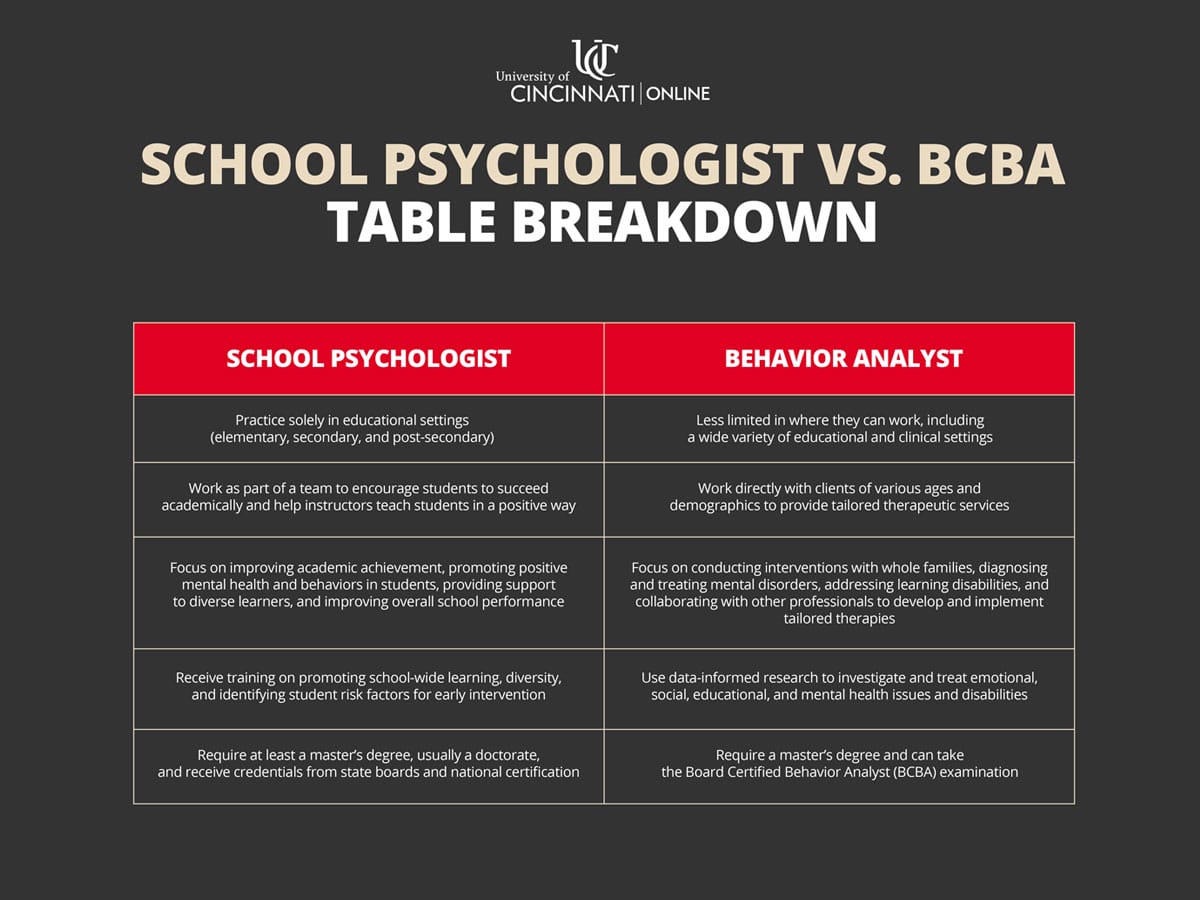School Psychologist vs. Behavior Analyst

School psychologists and behavior analysts are both responsible for consulting with clients and investigating how their individual emotional, social, family, and school situations mold their behaviors, with the goal of helping clients improve their interactions with others. Depending on the needs of the particular individual, there could be many overlapping therapies and educational programs used by both School Psychologists and Behavior Analysts. For example, both professionals may incorporate Positive Behavioral Supports (PBS) to build programs that enhance functional communication training and differentially reinforce appropriate behavior. They may also partner together to build social stories that offer contexts for codes of conduct or work toward developing successful peer-mediated interventions so that individuals have effective role models. While the similarities are evident, the differences between the careers are subtle in some ways and sharply delineated in others.
What Is a Board Certified Behavior Analyst?
Behavior analysts are qualified professionals who use data-informed research to investigate and treat emotional, social, educational and mental health issues and disabilities such as autism spectrum disorders, as well as comorbid categories including dyslexia, depression, bipolar disorder and intellectual development delays. The online Master of Education in Foundations in Behavior Analysis from the University of Cincinnati prepares future behavior analysts through a series of 10 courses that last 15 weeks each. These courses can be completed in as few as five semesters, or they can be conveniently taken at a time that fits within a busy work schedule. The program includes six courses that qualify graduates to take the Board Certified Behavior Analyst examination and offers coursework that can be immediately applied to the student’s current job. BCBAs are in high demand. According to the BACB, the "annual nationwide demand for individuals holding a BCBA or BCBA-D certification has increased each year since 2010."
What Is a School Psychologist?
School psychologists develop skills specifically in areas such as instructional support; prevention and intervention services; special education; crisis preparedness and response; professional ethics; learning interventions; and family, school, and community collaboration, according to the National Association of School Psychologists. They also receive training on how to promote school-wide learning and identifying student risk factors for early intervention. Psychologists need at least a master’s but usually earn a doctorate, which requires at least 90 semester hours of study, including a 1,200-hour internship. School psychologists receive credentials from their state boards and are nationally certified by the National School Psychology Certification Board. Upon graduation, they can find careers in traditional schools as well as juvenile justice programs, school district administration offices and school-based mental health centers.
Where They Practice
School psychologists practice solely in educational settings—elementary, secondary, and post-secondary—as part of a team that encourages students to succeed academically and instructors to teach students positively while offering constructive criticism. They work with students and their families as well as administrative staff to provide a safe, supportive environment where students can focus and excel. Board Certified Behavior Analysts (BCBAs) are less limited in where they may choose to work and thus have the opportunity to help clients of various ages and demographics in a wide variety of educational and clinical settings. “You can work as an independent practitioner as a BCBA,” said James Hawkins, PhD, an assistant professor and coordinator of the behavior analysis graduate program at the University of Cincinnati. Another faculty member from the same program, Neil Deochand, PhD, emphasized that “Behavior analysts’ jobs can take them across multiple settings.” This is evidence of the fact that, compared to school psychologists, BCBAs get more direct one-to-one tailored time to provide therapeutic services. The differences in career roles for school psychologists versus behavior analysts imply that the education and experience necessary for each are very different.
Job Duties
The job duties of school psychologists versus BAs differ. School psychologists mostly focus on improving academic achievement. This means promoting positive mental health and behaviors in students, providing support to learners and improving overall school performance. They also work to create safe learning environments for the school as a whole. Behavior analysts work on a deeper level with their clients. Their job duties include conducting interventions with whole families and diagnosing and treating mental disorders. They also address learning disabilities and cognitive, behavioral and emotional distress. They collaborate with physicians, social workers and other health care professionals to develop and implement tailored therapies for their clients. Here is a breakdown of the top five trending careers for Behavior Analysis.

Final Thoughts
While the education and core functions of each job are different, both careers require professionals to be empathetic, patient and trustworthy. Tending to the mental health of children requires commitment as well as excellent listening and communication skills. Additionally, the clinical aspects of the job demand meticulous data-gathering and analysis skills along with the ability to report findings clearly and without bias. Above all, though, school psychologists and behavior analysts must possess the desire to help others improve their lives. Mental health in children is paramount to their success later in life. School psychologists and behavior analysts play a role in aiding in their success, and while the two careers seem similar, they have different educational requirements, responsibilities, and job setting possibilities. When exploring a potential career as a school psychologist or behavioral analyst, it’s important to gain a clear understanding of the ultimate objectives of each position. By doing so, a student can choose the career that matches their overarching personal and professional goals.
Contact UC Online to Accelerate Your Behavior Analysis Career
Take the first step toward a more fulfilling behavior analysis career by contacting UC Online.